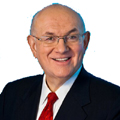"Ignore the presidential polls," experts tell us. "Presidential polls are meaningless" this early in the game.
OK, so why is everyone paying so much attention to them? Should anyone really care that Donald Trump has "surged" to the top of the crowded Republican field? Or that Senator Bernie Sanders (I-Vt.) is gaining ground on former Secretary of State Hillary Clinton in the Democratic race?
The reality is, there's a market for this kind of information. Where there is a market, there will be a product. But in this case, the product is not what people think it is.
What people want is an accurate prediction of what's going to happen next year. Polls are not designed to do that. What they give you is a snapshot of where things stand right now. You can use that to predict what's going to happen a year from now only if you assume that nothing is going to change.
But things change. In 2007, the polls made Senator Hillary Clinton look like a sure thing for the 2008 Democratic nomination. Then Senator Barack Obama won the Iowa caucuses and everything changed.
In 2003, polls showed former Vermont Governor Howard Dean dominating the 2004 Democratic race. But in the first two weeks of January, Dean's Iowa support drained away after it was revealed that he had mocked the state's revered caucuses.
In the 2012 Republican race, we had a different frontrunner in the polls almost every month: Representative Michele Bachmann in June 2011, Texas Governor Rick Perry in August, Herman Cain in October, former House Speaker Newt Gingrich in December. Mitt Romney didn't become the frontrunner until he won the New Hampshire Republican primary in January.
Donors certainly pay attention to polls. They put money on candidates, and they want to know if a candidate looks like a good bet. Partisans pay attention, too. They are looking for a winner. Partisans use polls to tell them which candidate is most "electable."
Polls in 2008 showed Senator John McCain (R-Ariz.) was the most "electable" Republican — even though he was distrusted by conservatives. So conservatives went along with McCain. Same with Romney in 2012. And what happened? McCain and Romney both lost.
This year, polls have taken on a new role. It's impossible to have a debate with 17 Republican contenders on stage. So Fox News is planning to invite only the candidates who rank in the top 10 in the polls to the first debate on Aug. 6.
Right now, the line would be drawn between 2 percent for Perry and former Pennsylvania Senator Rick Santorum (who tie for 10th place) and 1.5 percent for Ohio Governor John Kasich. Yet that line has no statistical validity given the typical margin of error (plus or minus 5 percent) for most polls of likely primary voters.
You can be sure that the excluded candidates will protest loudly. Why should Trump be invited but not the former governor of New York?
What the polls measure at this point is mostly name recognition. That's something non-celebrity candidates have to work hard for because Americans will not vote for a candidate they have never heard of. Very few people outside of New York know who former New York Governor George Pataki is. Most everyone has seen Trump on television.
Name recognition is also why Clinton is leading all the Republican contenders in trial- heat polls for the general election. Everyone knows who Clinton is. She's been in national public life for 23 years. Most voters don't know any of her potential Republican opponents.
The media is often criticized for covering a presidential election as if it were a horse race. Actually, it is a horse race. I have covered presidential politics for more than 40 years. People rarely come up to me and ask what the candidates' issue positions are. What they ask is, "Who's going to win the Republican nomination?" or "Who's going to win the election?" That's why there's a market for polls.
In British elections, the market for polls is even greater than in the United States. British tabloids print screaming front-page headlines with the latest poll results, often carried out to two decimal places ("Conservatives 34.18! Labor 32.65!").
That's because in Britain, people are allowed to bet legally on the election results. Wagerers need to know what the latest odds are. That creates a huge market for polls.
But look at what happened in the May 7 British election. All the major polls got the outcome completely wrong.
Previously:
• 07/22/15: What the latest presidential polls tell us --- hint, it's not who's going to win
• 06/22/15: A Two-Oxymoron Race
• 06/18/15: Losing Our Religion: Not so fast, Dems
• 06/15/15: Rebellion in the Dems' Ranks
• 06/11/15: Divide and Conquer
• 10/22/14: Dems Are Having Trouble With the Working Class, Just Like the 2010 Midterms
Bill Schneider, a leading U.S. political analyst, is a Distinguished Senior Fellow and Resident Scholar at Third Way. Along with his work at Third Way, Bill is the Professor of Public and International Affairs at George Mason University and is a contributor to the AL Jazera English network. Bill was CNN's senior political analyst from 1990 to 2009 and was a member of the CNN political team that was awarded an Emmy for its 2006 election coverage and a Peabody for its 2008 coverage. Schneider has been labeled "the Aristotle of American politics'' by The Boston Globe. Campaigns and Elections Magazine called him "the most consistently intelligent analyst on television.''
Comment by clicking here.



 Contact The Editor
Contact The Editor
 Articles By This Author
Articles By This Author